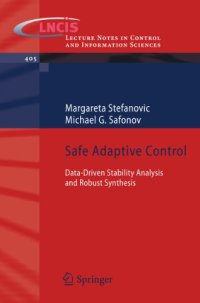
Ebook: Safe Adaptive Control: Data-driven Stability Analysis and Robust Synthesis
- Genre: Mathematics // Algorithms and Data Structures
- Tags: Control, Systems Theory Control, Optimization, Artificial Intelligence (incl. Robotics)
- Series: Lecture Notes in Control and Information Sciences 405
- Year: 2011
- Publisher: Springer-Verlag London
- Edition: 1
- Language: English
- pdf
Safe Adaptive Control gives a formal and complete algorithm for assuring the stability of a switched control system when at least one of the available candidate controllers is stabilizing. The possibility of having an unstable switched system even in the presence of a stabilizing candidate controller is demonstrated by referring to several well-known adaptive control approaches, where the system goes unstable when a large mismatch between the unknown plant and the available models exists ("plant-model mismatch instability"). Sufficient conditions for this possibility to be avoided are formulated, and a "recipe" to be followed by the control system designer to guarantee stability and desired performance is provided. The problem is placed in a standard optimization setting. Unlike the finite controller sets considered elsewhere, the candidate controller set is allowed to be continuously parametrized so that it can deal with plants with a very large range of uncertainties.
Safe Adaptive Control gives a formal and complete algorithm for assuring the stability of a switched control system when at least one of the available candidate controllers is stabilizing. The possibility of having an unstable switched system even in the presence of a stabilizing candidate controller is demonstrated by referring to several well-known adaptive control approaches, where the system goes unstable when a large mismatch between the unknown plant and the available models exists ("plant-model mismatch instability"). Sufficient conditions for this possibility to be avoided are formulated, and a "recipe" to be followed by the control system designer to guarantee stability and desired performance is provided. The problem is placed in a standard optimization setting. Unlike the finite controller sets considered elsewhere, the candidate controller set is allowed to be continuously parametrized so that it can deal with plants with a very large range of uncertainties.